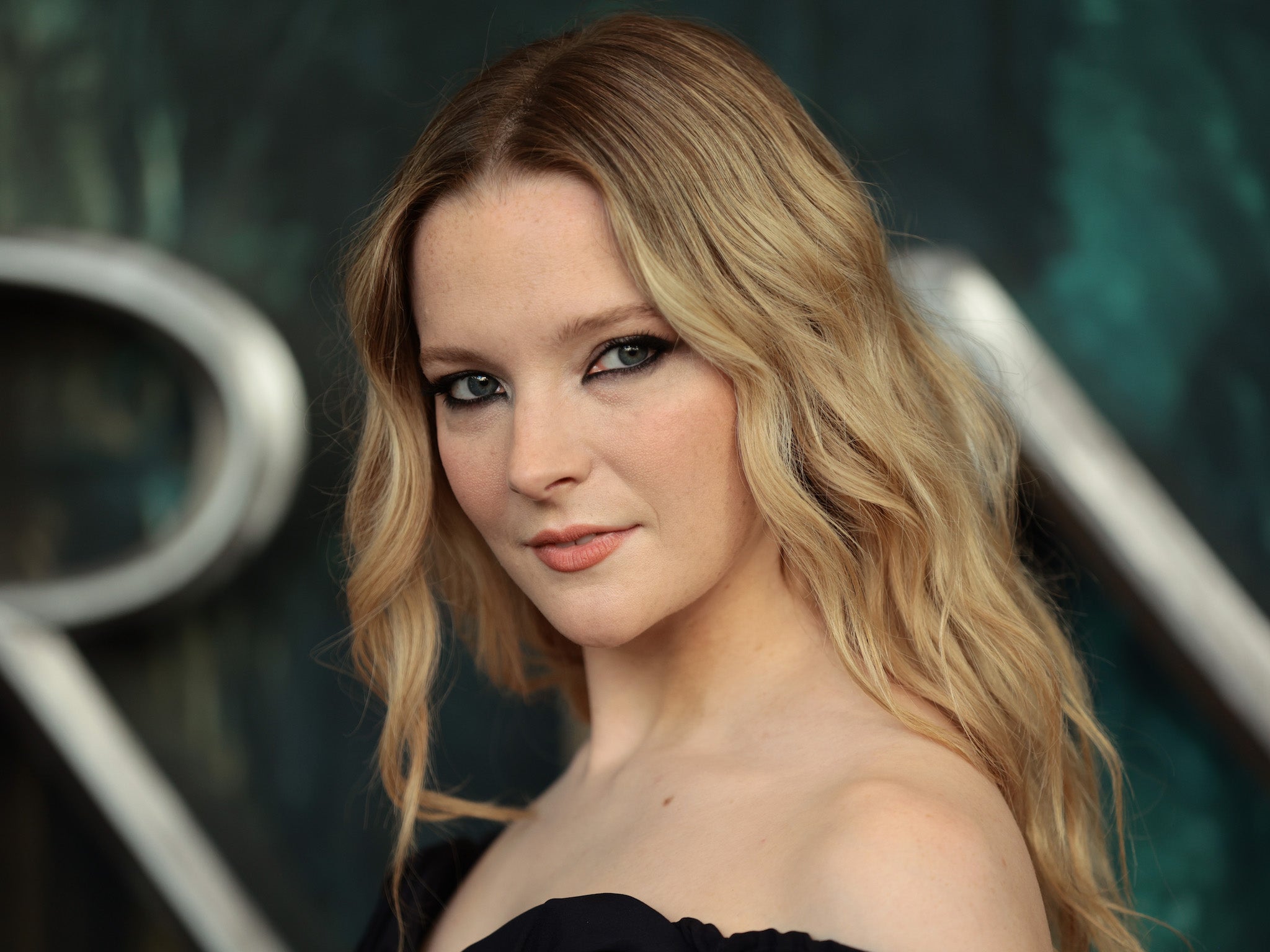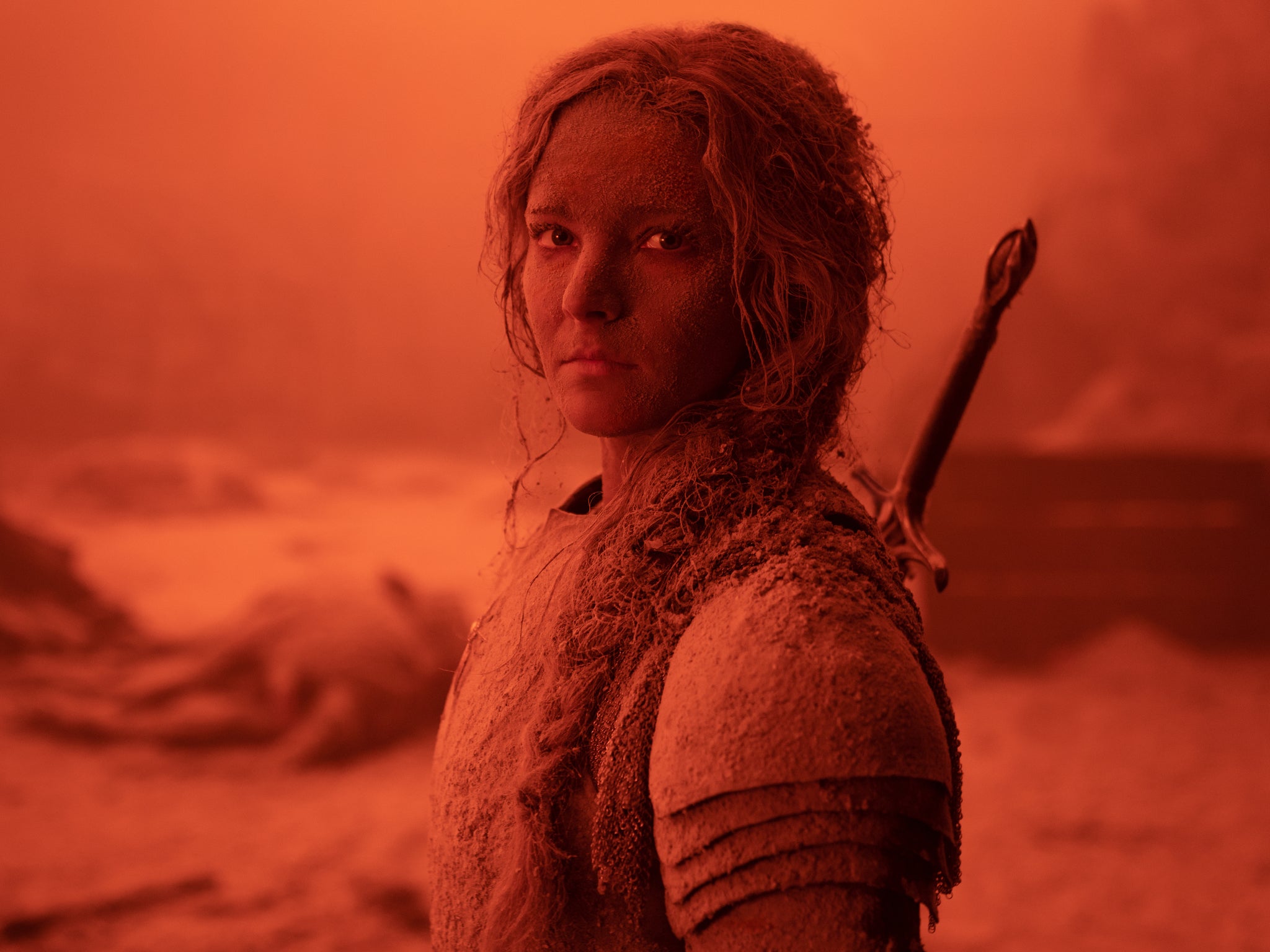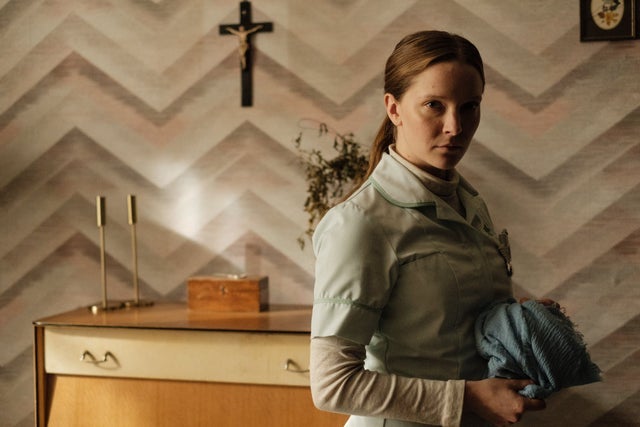The Rings of Power’s Morfydd Clark: ‘I have a slightly unnerving face. I can look quite extreme and a bit evil’
The actor who stars as Galadriel in the new Lord of the Rings spin-off talks to Nick Hilton about going global, growing up a Hobbit fan in Wales, and whether Amazon are ‘Tolkien-washing’


London, New York, Tokyo: there isn’t a major city in the world that hasn’t, in recent weeks, been invaded by an army of advertising for Amazon’s new Lord of the Rings television series, The Rings of Power. From billboards to the sides of buses, at the heart of this marketing campaign is the figure of Galadriel – the character originally played by Cate Blanchett – whose sweeping blonde hair and steely gaze will now be instantly familiar to commuters.
“I still don’t believe that I’m gonna be famous,” says Morfydd Clark, the new Galadriel, perched on a chair in a swish London hotel. “I can’t think about that too much, because I don’t have any vision of it. It’s very weird.”
The Welsh actor, who has previously starred in acclaimed films such as Saint Maud and The Personal History of David Copperfield (as well as playing supporting roles in the BBC’s Dracula and His Dark Materials on the small screen) has gone from relative anonymity to total ubiquity in the blink of an eye. In the past few weeks, she’s addressed thousands of JRR Tolkien fans at Comic-Con in San Diego and appeared on American late-night talk shows.
We’re meeting the day after the Leicester Square premiere of the show, but she’s looking remarkably fresh-faced. “I feel like we’re all just on some sort of constant high,” she explains. “There’s going to be a reflective period of, like, ‘What just happened in the last three years?’”
Whether she’s ready for it or not, the journey she’s been on is about to turn her into a household name. This is no mean feat, given that her name has required countless interviewers (myself included) to seek out dubious pronunciation videos on YouTube, where robot voices attempt to wrap their automated tongues around the “dd” letter of the Welsh alphabet.
“I feel a bit awkward talking about this with an Englishman,” she demurs when I ask her whether her native tongue is now an endangered species.
“When I was a teenager, it was very much more like ‘Welsh is a s*** language, Welsh is a dead language. Why do you bother speaking it?’” Clark was raised in Penarth, one of the southernmost towns in Wales, just a few miles from the cosmopolitan hub of Cardiff. “Now people are much more excited by it. It still has a long way to go, because what we’re seeing as the Welsh experience is very white, whereas Cardiff is one of the most diverse cities in Britain. It’s just a cool time, isn’t it, for all smaller groups.”
Describing Clark as elfin would be objectionably lazy given that her role in the series is that of an elvish queen, the so-called “Lady of the wood” of Lothlórien. But just as Martin Freeman spent much of his career awaiting the call to play a hobbit (there is just something in his face that makes you picture him bare-footed, smoking a pipe and rambling across the countryside), Clark has an angular beauty, by turns both innocent and austere, that screams, to me at least, “Elf!”.
“I much more thought that I’d be a hobbit than an elf,” she tells me, in what is a very nerdy form of modesty. “I think I have a slightly unnerving face. I can look quite extreme and a bit evil. Which I guess is slightly elfish, maybe!”

Watch Apple TV+ free for 7 day
New subscribers only. £9.99/mo. after free trial. Plan auto-renews until cancelled.
ADVERTISEMENT. If you sign up to this service we will earn commission. This revenue helps to fund journalism across The Independent.

Watch Apple TV+ free for 7 day
New subscribers only. £9.99/mo. after free trial. Plan auto-renews until cancelled.
ADVERTISEMENT. If you sign up to this service we will earn commission. This revenue helps to fund journalism across The Independent.
Growing up, she went to see the Lord of the Rings movies with her family. “My parents loved the books,” she recalls. “My dad had read The Hobbit to me... I was watching it wanting to actually be in Middle-earth.” The “fellowship”, she says, resonated more strongly with her as a group of fictional characters than as a potential career path (when did she first start thinking about acting? “As grades started to be not good,” she deadpans) and it was not until turning 30 in 2019 that she was cast in her own Tolkien adventure.

Before that, she attended the now-closed Drama Centre London, whose alumni include Michael Fassbender, Colin Firth and Anne-Marie Duff. “Drama school is very particular,” she tells me. “Very, very strange.” But winning a place at a prestigious drama school, as all aspirant actors know, is still no guarantee of success. “I think you realise how much more it’s luck once you’ve gone to drama school, because you are with a group of incredibly talented people and the odds are that it won’t happen for everyone.”
So what was the lucky moment for her? “First of all, I’m Welsh, and Gavin and Stacey had just come out. So that’s one bit of luck, right? The other bit of luck is that I had a family that really supported me and could support me emotionally and financially, should I need it. Another thing, I’m white and conventionally pretty.”
None of these sounds particularly like a Sliding Doors moment to me. Perhaps the bigger slice of luck was being cast in Rose Glass’s acclaimed psychological horror Saint Maud, and Armando Iannucci’s charming reimagination of David Copperfield, both of which were released in 2019 as filming commenced on Amazon’s fantasy leviathan.
The Rings of Power’s filming schedule required relocating to New Zealand – the cinematic home of Middle-earth – from October 2019 to August 2020. During that time, certain world events threw the production into chaos. “We got shut down, like everyone did,” she tells me. “New Zealand, very luckily or very strategically, reacted in a very particular way. There was no Covid there, and so we came out and carried on working, but no one could leave.” Friends and family back in the UK were less lucky. “I was having Zoom parties with all my friends – 6am for me – and they were just drinking their sorrows away.”
I think art and film are turning into things that people could spend a billion dollars on, which is hard to comprehend. And then at times I do just go into my little elf world
That Antipodean bubble, cut off from the world far more than Clark could have expected when she signed the contract, changed the nature of the process. “You often don’t meet everyone that’s on a film or TV series with you,” she tells me. “And this felt much more like a theatre job. We were all in Auckland across all the different storylines.”
And the show has many different threads, from Galadriel’s monomaniacal pursuit of the dark sorcerer Sauron (familiar to viewers as the big flaming eye of the original trilogy) to new character Elanor Brandyfoot’s nursing of a strange, celestial arrival, via Elrond’s work building a suspiciously enormous forge. If the makers of Game of Thrones are sick of their show being described as “Lord of the Rings for grown-ups”, it’s only fair to rebalance the scales and say that this feels like “Game of Thrones for the whole family”.
The Rings of Power is set to be the most expensive television show ever made, and the first to cross that fabled billion-dollar spend threshold. Amazon spent $250m (£216m) on the acquisition of the rights alone, a deal that permits them to produce 50 hours of content drawn from Tolkien’s appendices. “My grandfather’s the one who introduced me to Tolkien,” Amazon founder and sometime richest person on earth, Jeff Bezos, said in a speech at the UK premiere. “I fell in love immediately.” This top-down enthusiasm has given the creators a blank cheque to develop a staggeringly indulgent new vision of Middle-earth.

But outside the luxury suite we’re meeting in, the streets are littered with newspapers bearing headlines about energy prices, staggering inflation rises, and even Amazon’s own warehouse workers in the UK staging a protest at a 35p pay rise. How does she deal with the cognitive dissonance of starring in such a lavish production at a time like this? Is this a form of what you might call “Tolkien-washing”, cynically using these beloved books to reframe the narrative around the world’s second-largest company?
“I think we should listen to workers, and that people are being very brave at this moment in time,” she offers, diplomatically, as a PR fidgets nervously by the door. “As people, you have to constantly re-evaluate and think about what you’re doing and the effects that you’re having. And I think, particularly as actors, it’s important not to forget you’re part of bigger things when you’re in this flashy world.” The antidote? “I listen to Punisher a lot, the album by Phoebe Bridgers. It’s kind of about having a good time at the end of the world.”
“Going back to Wales,” she continues (she describes herself as “one-track minded” on the subject of her home nation), “all the film studios that have opened in Wales have made a big difference to jobs. I think art and film are turning into things that people could spend a billion dollars on, which is hard to comprehend. And then at times I do just go into my little elf world.”
‘The Lord of the Rings: The Rings of Power’ is available to watch on Amazon
Join our commenting forum
Join thought-provoking conversations, follow other Independent readers and see their replies
Comments


Bookmark popover
Removed from bookmarks